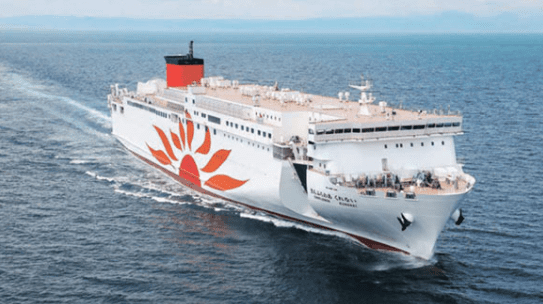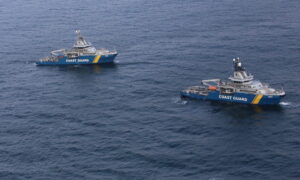
Photo credit: MOL / The Shofu Maru
Japan’s shipping major Mitsui O.S.K. Lines (MOL) has earned two awards in Japan’s ”Ship of the Year 2022”.
The Shofu Maru, the world’s first coal carrier equipped with the Wind Challenger hard sail wind propulsion system, owned and operated by MOL, has received the ”Ship of the Year 2022” award.
In addition, Japan’s first LNG-fueled ferry, the Sunflower Kurenai, owned by MOL and operated by its group company Ferry Sunflower, has received ”Large Passenger Ship Sector” award.
The ”Ship of the Year Awards”, presented annually by the Japan Society of Naval Architects and Ocean Engineers (JASNAOE), are given to outstanding vessels or offshore structures built in the past year, based on technical, artistic, and social considerations, as MOL explains in its statement.
This is MOL’s seventh ”Ship of the Year” award, and the first time in three years that MOL Group operated ship has won some kind of prize in ”The Ship of the Year Awards” since the 2019 LNG-fueled tugboat Ishin.
The Shofu Maru is a 100,000 DWT coal carrier equipped with the Wind Challenger hard sail system and transport coal mainly from Australia, Indonesia and North America as a dedicated vessel for Tohoku Electric Power Co.
The vessel earned high marks for its significant reduction of greenhouse gas (GHG) emissions by directly using wind power as a propulsion force, and for the development and implementation of ancillary equipment such as a fully automated control system that maintains the sail in an optimal state, according to ocean weather conditions.
The ships also has a Weather Routing System that suggests the best route for the vessel.
According to MOL, the Sunflower Kurenai is Japan’s first LNG-fueled ferry, which reduces environmental impact and furthers Japan’s efforts toward a modal shift in cargo transport.
“In particular, the vessel was highly regarded for its stable LNG-fueled operation, which not only reduces GHG emissions, but also contributes to the reduction of environmental impact in coastal and port waters, and for its contributions to LNG infrastructure development, which has a limited track record in Japan.
The fact that LNG fueling was achieved on the familiar and historic Osaka-Beppu route was also recognized, not only for its immediate effects, but also for its role in raising awareness of the need to reduce environmental impact,” states Mitsui O.S.K. Lines.

Photo credit: MOL / the Sunflower Kurenai


